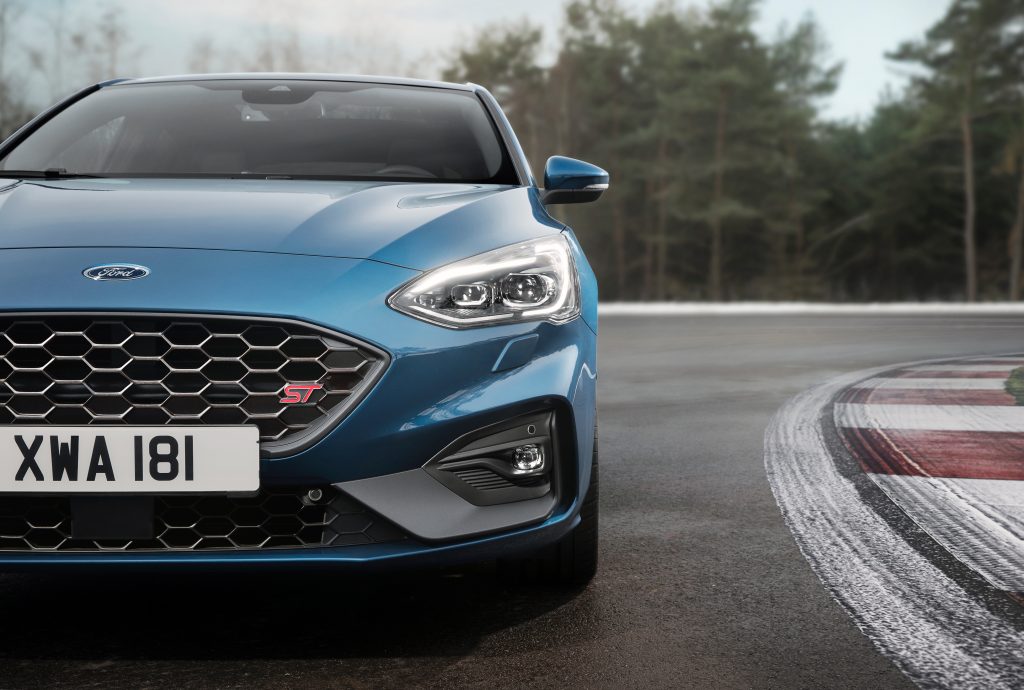- Ford Performance-developed all-new Focus ST enhanced with advanced sports technologies will go on sale in the summer in five-door and wagon body styles
- Powerful, free-revving powertrains include 280 PS, 420 Nm, 2.3-litre EcoBoost petrol with twin-scroll turbo and anti-lag; 190 PS 2.0-litre EcoBlue diesel with 400 Nm from 2,000 rpm
- First Ford front-wheel drive electronic limited-slip differential improves traction and stability. Rev-matching offered for short-shift six-speed manual gearbox. Seven-speed auto available
- Selectable Drive Modes a first for Focus ST, adjusting features including Electronic Brake Booster and fastest Ford electric power-assisted steering to match performance to scenario
- Comfort and driving experience optimised with Recaro sports seats and advanced independent rear suspension configuration with available Continuously Controlled Damping
FORD TODAY REVEALED THE ALL-NEW FOCUS ST – developed by Ford Performance to deliver nimble hot-hatchback thrills in a stylish, comfortable and practical family car.
The all-new Focus ST builds on the class-leading driving dynamics of the fourth generation Focus in five-door and wagon body styles. Ford’s new C2 architecture is enhanced with unique suspension, braking and powertrain configurations for the most responsive and agile Focus ST driving experience ever – on road and track.
A new engine line-up makes available to drivers up to 12 per cent more power and 17 per cent more torque compared with the previous generation Focus ST. Ford’s 280 PS 2.3-litre EcoBoost petrol and 190 PS 2.0-litre EcoBlue diesel engines* both deliver a broad spread of power and torque across the rev-range, for fast-revving sports performance.
Ford’s first application of an electronic limited-slip differential (eLSD) for a front-wheel drive vehicle further enhances as standard the cornering and stability of the EcoBoost-powered variant – sharpening responses to changing grip levels and driver inputs using computer-controlled pre-emptive actuation.
A choice of six-speed manual or quick-shifting new seven-speed automatic transmissions is offered, and Selectable Drive Modes technology is introduced to the Focus ST for the first time, enabling drivers to adjust the vehicle’s character to suit the driving scenario. Continuously Controlled Damping (CCD) – standard for five-door EcoBoost variants – enhances the short long arm (SLA) independent rear suspension configuration for ultimate refinement.
“Intelligent technologies like eLSD and CCD make our all-new Focus ST the most ‘Jekyll and Hyde’ yet, able to switch from refined tourer to focussed performance car at the push of a button,” said Leo Roeks, Ford Performance director, Europe. “We’ve incorporated learnings from programmes including our Ford GT supercar and the acclaimed Focus RS to develop a mid-size performance car with a degree of flexibility that’s unique in its segment.”
The all-new Focus ST will be manufactured with best-ever craftsmanship and quality following a €600 million investment at Ford’s Saarlouis assembly facility, Germany.
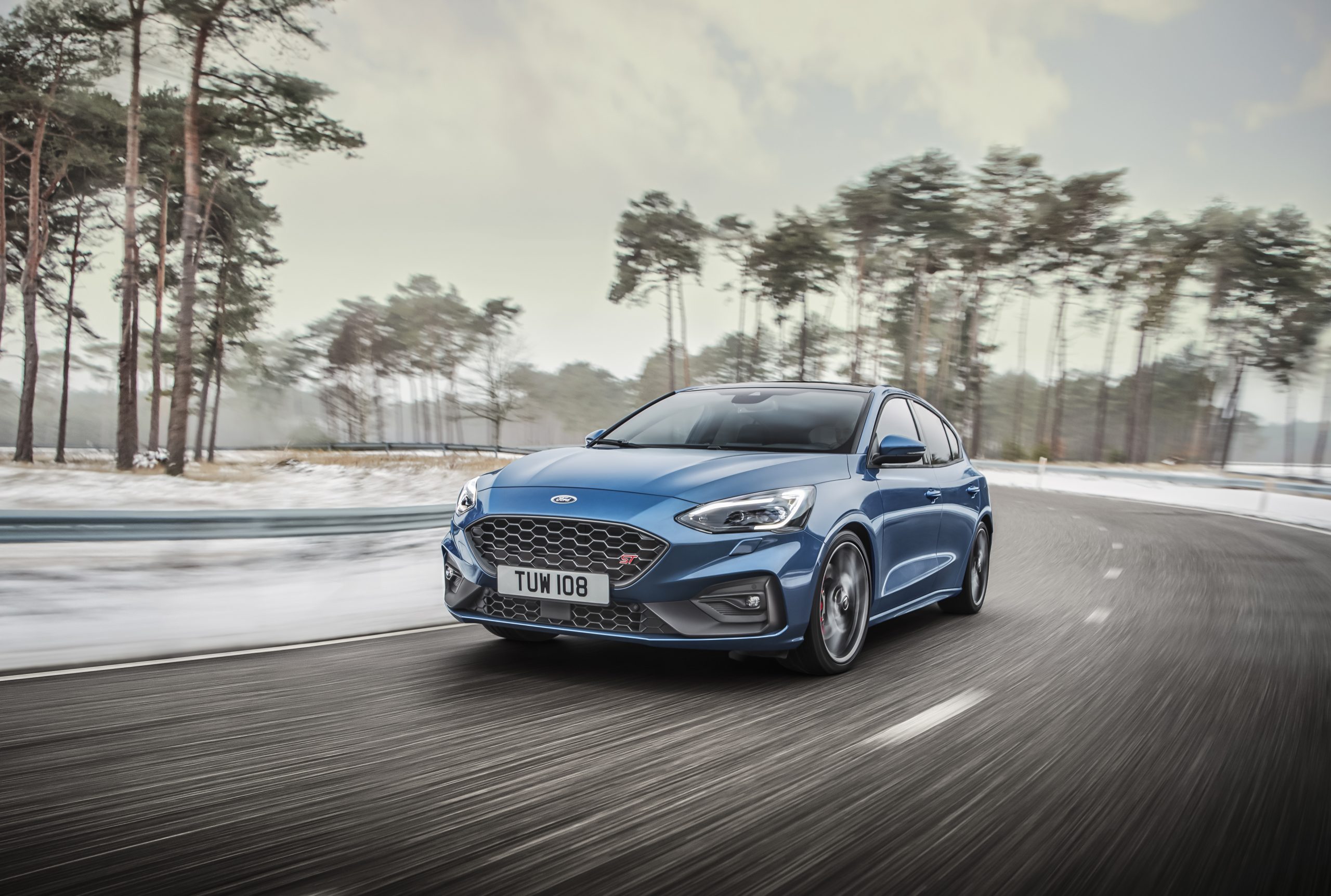
Responsive power delivery
A new generation of Ford’s 2.3-litre EcoBoost all-aluminium engine is the most powerful ever offered for a Focus ST. Using advanced turbocharging technology to deliver 280 PS power at 5,500 rpm and 420 Nm of torque from 3,000 rpm to 4,000 rpm, it is also the most free-revving Focus ST engine ever, and supports anticipated 0‑100 km/h (0-62 mph) acceleration in less than 6 seconds.
Engine response is enhanced using a low-inertia twin-scroll turbocharger, which scavenges exhaust gas energy more effectively using separated channels to minimise interference between gas pulses. An electronically actuated waste-gate allows closer control of boost pressures for optimised engine performance. In addition, a unique exhaust system that reduces back pressure, bespoke air intake system and optimised intercooler further improve breathing.
Innovative anti-lag technology developed for the Ford GT supercar and F-150 Raptor pick-up is introduced to the Focus ST, for immediate power delivery in Sport and Track Drive Modes. Anti‑lag keeps the throttle open when the driver lifts off the accelerator pedal, alleviating the reversal of air flow from the turbocharger to maintain compressor wheel speed and enabling boost pressure to build faster on demand.
Ford’s 190 PS 2.0-litre EcoBlue is the most powerful diesel engine ever offered for a Ford Focus model, delivering peak power at 3,500 rpm and 400 Nm of torque between 2,000 rpm and 3,000 rpm – and 360 Nm from 1,500 rpm – for immediate and linear acceleration.
A low-inertia variable geometry turbocharger; steel pistons for less expansion when hot; and an integrated intake system with innovative mirror-image porting for optimised combustion help to deliver a diesel powertrain that produces 10 per cent more power and more than twice as much torque as the 2.0‑litre Duratec ST petrol engine in the first generation Focus ST.
The Focus ST’s six-speed manual transmission enables more urgent gear-changes and provides a sportier feel with a shift-throw reduction of 7 per cent compared with the standard all-new Focus. Ford’s new rev-matching technology that debuted on the new Ford Mustang is also introduced as part of an optional Performance Pack for 2.3-litre EcoBoost manual models.
Delivering smoother, faster downshifts, the technology is accompanied by a shift indicator light, and uses the engine’s electronic control system to briefly “blip” the throttle as the driver engages a lower gear – matching the engine rotation speed to that of the gear that is being selected.
Rev-matching enables less-experienced performance drivers to benefit from the seamless, momentum-maintaining gearshifts delivered by the “heel-and-toe” driving technique, while also enabling experienced performance drivers to deactivate the system if they prefer.
A new seven-speed variant of Ford’s latest intelligent automatic transmission family complements the rewarding, engaging and sporty 2.3-litre EcoBoost driving experience. Gear differentiation is optimised for performance, and Adaptive Shift Scheduling – which assesses individual driving styles to optimise gearshift timings – is enhanced to offer more flexibility and the ability to differentiate between road and track use. Drivers can select gears manually using steering wheel-mounted paddle-shifters.
“The EcoBoost petrol and EcoBlue diesel powertrains have unique characters, but are equally charismatic,” Roeks said. “The Focus ST’s sporty ‘pops and bangs’ soundtrack perfectly matches the car’s feisty performance and is an essential part of the ST experience.”
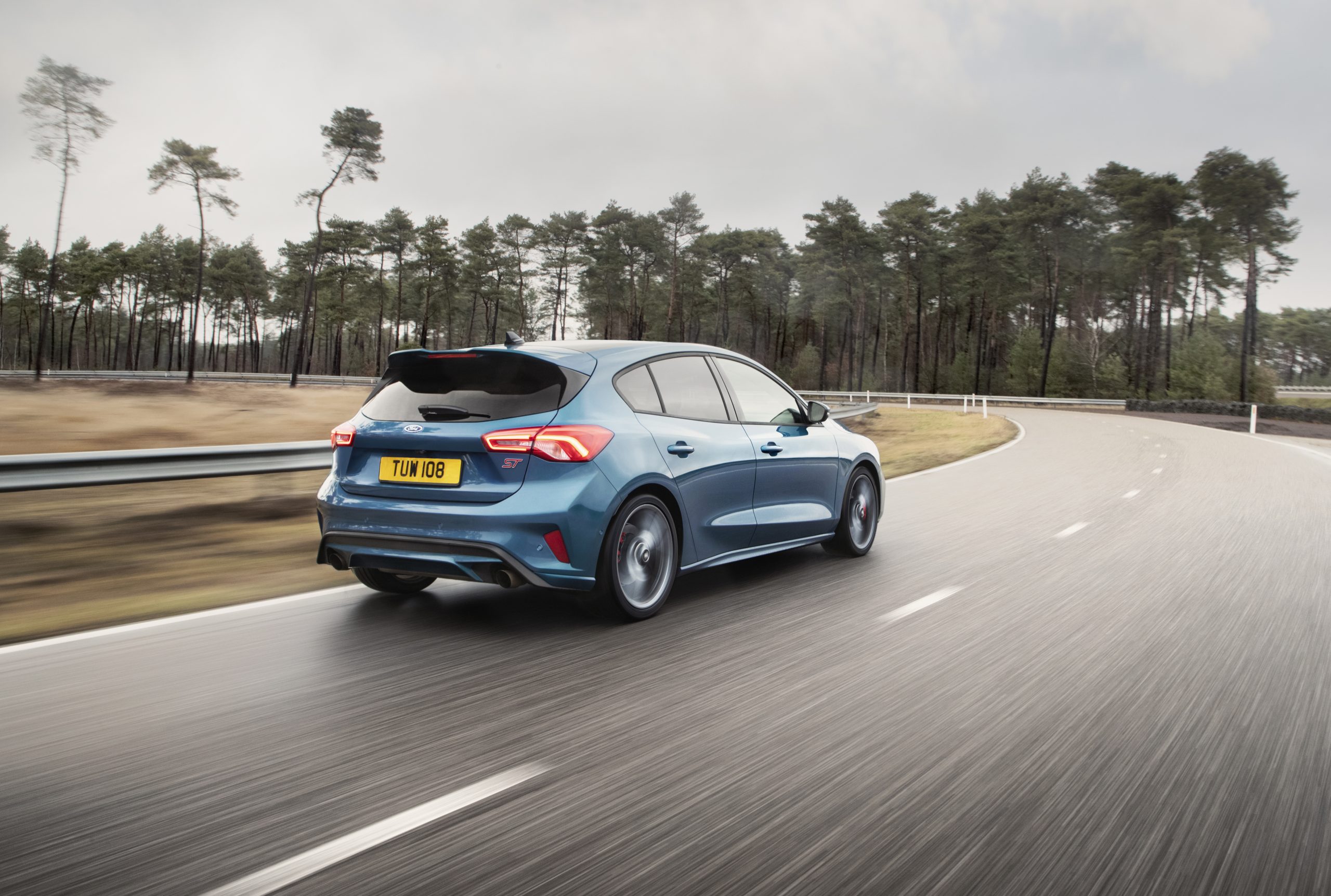
Intuitive dynamics enhanced with technology
Building on accomplished Ford Focus driving dynamics, the new Focus ST was developed to blend B-road fun-to-drive, legitimate track-day performance, and everyday usability better than any vehicle in its class.
The SLA suspension configuration helps optimise the vehicle’s responses to driver inputs without sacrificing comfort, and includes a unique geometry for wagon models that repositions the dampers helping the vehicle remain nimble and responsive even when fully loaded. The agile and energetic character of the standard Focus is retained using the original spring specifications, with damping stiffness increased up to 20 per cent at the front and 13 per cent at the rear, and ride height reduced by 10 mm, to improve road-holding and response in performance driving scenarios.
Ford’s sophisticated CCD technology every 2 milliseconds monitors suspension, body, steering and braking inputs to adjust damping responses for outstanding ride quality and driving dynamics.
The driving experience is further enhanced using eLSD technology for Focus ST 2.3 litre EcoBoost models. Incorporated into the transmission, the system uses hydraulically activated clutches to limit the engine torque delivered to a wheel that has reduced traction on the road surface, and redistributes up to 100 per cent of available torque to the wheel with more traction to counteract wheelspin that can hamper acceleration through, and out of, corners.
The Borg Warner-developed technology is faster to deploy and offers greater precision than a traditional mechanical LSD. The system can pre-emptively adjust torque distribution using inputs from powertrain and vehicle dynamics sensors, rather than responding to wheelspin as it occurs, and can apply differential locking gradually for fine-tuning performance.
Focus ST 2.0-litre EcoBlue models feature Torque Vectoring Control technology, which improves road holding and reduces understeer by applying brake force to the inside front wheel when cornering.
The all-new Focus ST steals Ford’s fastest-steering-response crown from the acclaimed Fiesta ST. The electric power-assisted steering (EPAS) system is 15 per cent faster than the standard Focus, requiring just two turns lock-to-lock.
Class-leading connected feel is supported by unique steering knuckle geometry, with a rod attachment point 9 mm further forward and 6.5 mm higher than the standard Focus for sharper responses. New Steering Torque Disturbance Reduction software for EPAS also helps reduce torque steer, making it even easier to deploy with precision the Focus ST’s power and torque via bespoke-specification Michelin Pilot Sport 4S tyres.
Larger front and rear brake components provide the foundation for a high performance braking system with improved stopping power and fade resistance. Front disc dimensions have grown to 330 mm x 27 mm and feature dual-piston callipers. Rear discs now measure 302 mm x 11 mm. Focus ST braking performance was verified using the same demanding test procedures as the Ford GT supercar, and achieved almost four-times the fade resistance performance of the previous generation Focus ST in testing.
The C2 architecture’s Electric Brake Booster (EBB) further demonstrates its advantages in the Focus ST application. The technology builds brake pressure faster than a hydraulic system for a more connected, confident and consistent pedal feel across a broader range of operating conditions. For the Focus ST, this means the system can both mitigate for changes in braking behaviour experienced during high performance driving, and can adjust the braking feel and dynamics to match the selected Drive Mode.
In addition, Slippery/Wet, Normal, Sport and – for models equipped with the Performance Pack – Track Drive Modes adjust eLSD, CCD, EPAS, throttle mapping, automatic transmission shift scheduling, electronic stability control, electronic sound enhancement (ESE) and climate settings to suit the driving scenario. A dedicated “Sport” button on the flat-bottomed steering wheel gives direct access to Sport mode, and an additional “Mode” button allows drivers to quickly scroll through the Drive Mode options.
“Selecting Track mode instantly makes braking response more direct and edgy; introduces higher steering efforts for more feedback; tunes the throttle to be more aggressive; instructs the eLSD to deliver maximum traction; and gives drivers more leeway within the ESC system,” said David Put, Ford Performance vehicle dynamics. “Drivers can have full confidence in the Focus ST’s ability to deliver on the track.”
The traditional Focus ST gauge cluster benefits from a contemporary execution inspired by the Ford GT supercar. Digital turbocharger boost pressure, oil pressure and oil temperature gauges are now displayed in a bespoke Ford Performance screen on the 4.2-inch, TFT colour instrument display. Launch Control for consistently fast standing starts on track is also delivered via the Performance Pack for 2.3-litre EcoBoost models.
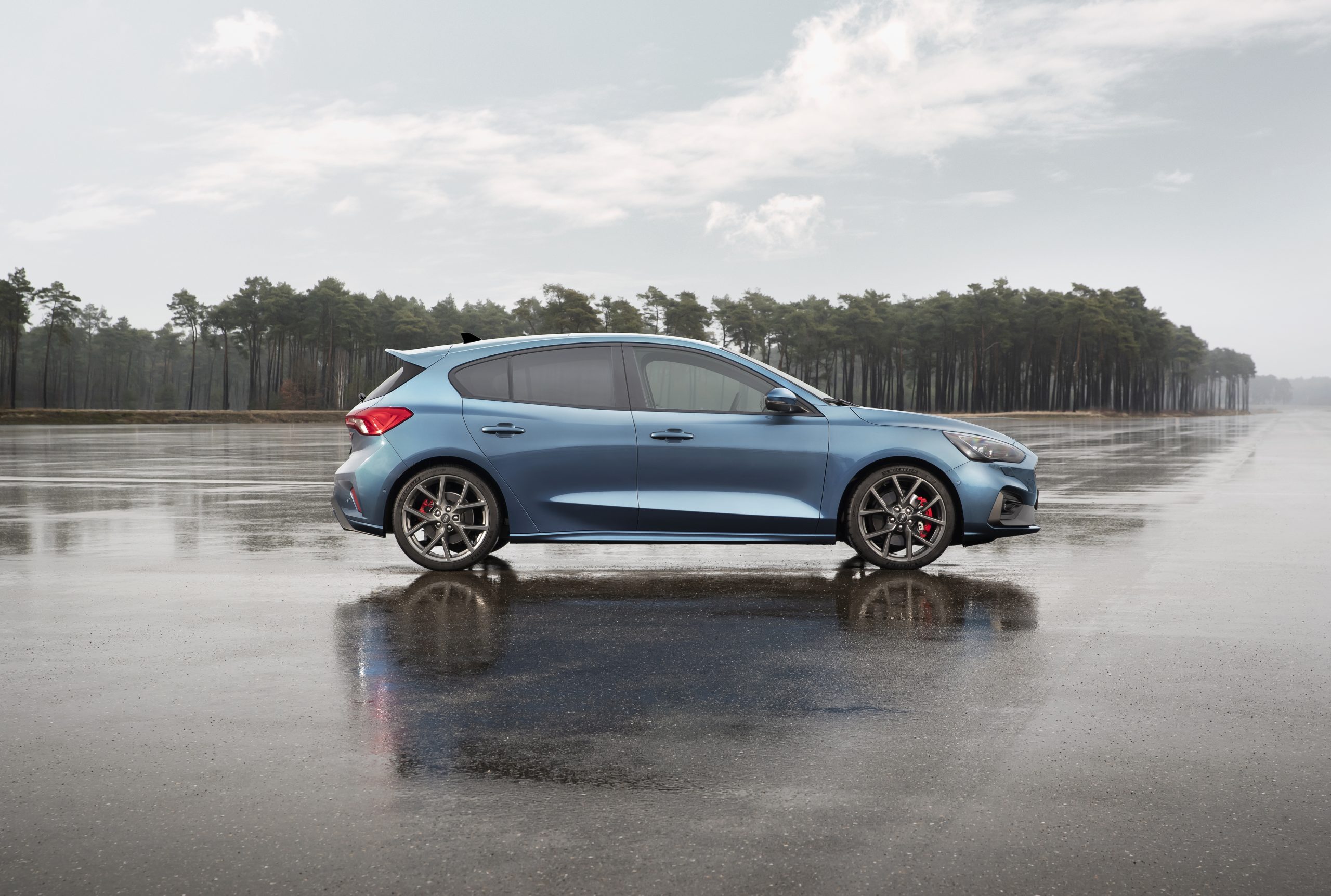
Developed for form and function
Developed to be as comfortable as it is fun-to-drive, the all-new Focus ST exploits the class-leading roominess and exceptional refinement of the standard Focus range, and features an upscale interior that balances everyday practicality and a true sporty driving experience.
Ford Performance engineers fine-tuned the positioning of supportive Recaro front seats to complement the connected and in-control feel for the driver, while ESE technology amplifies genuine engine and exhaust noise in Sport and Track modes – heightening the sports driving sensation and delivering additional feedback to assist performance drivers.
Tuned engine mounts and an isolated subframe – alongside available CCD technology – increase refinement for all occupants. Generous front shoulder room and best-in-class rear knee clearance combine with maximum 1,653-litre wagon luggage capacity and a boot space that can comfortably accommodate a large dog crate, for maximum comfort and practicality.
In addition to the sports steering wheel and Ebony coloured Recaro seats with a choice of high-quality cloth, leather, or partial leather and Miko Dinamica materials, the unique Focus ST interior intensifies the sporty atmosphere with an ST-embossed aluminium gear knob and scuff plates; alloy pedals; metallic hexagonal and satin silver decorative elements; and metal grey stitching for the seats, door inserts and centre console soft side pads.
The Focus ST builds on the premium, sporting Focus silhouette with subtle, functional styling changes and unique alloy wheel designs. Revised upper and lower front grille designs are optimised for increased cooling capability, and bold signature lower wing elements channel air in to the air-curtain inlets for improved aerodynamic performance.
A larger, more steeply angled rear roof spoiler increases downforce to support the Focus ST’s driving dynamics. A twin exit tailpipe configuration borders the aggressively styled rear diffuser element, and improves practicality by delivering the towing capability that was prevented by the centre-exit tailpipes of the previous generation Focus ST. The Performance Pack also adds red brake callipers.
Exterior colour options chosen to emphasise the Focus ST’s dynamic styling include exclusive Ford Performance Blue and Orange Fury, alongside Frozen White, Magnetic grey, Race Red, Ruby Red and Shadow Black. Bold alloy wheel options include 18-inch Dark Sparkle and Magnetite designs, with a 19-inch wheel also offered in Magnetite.
The Focus ST also benefits from the comprehensive range of sophisticated Ford driver assistance technologies that have helped the all-new Focus win 13 awards and a 5-star safety rating since going on sale in 2018.
Seamlessly integrated technologies that enable an intuitive, stress-reducing and refined driving experience include:
- Adaptive Cruise Control now enhanced with Stop & Go, Speed Sign Recognition and Lane-Centring for effortlessly negotiating stop-start traffic
- Ford’s Adaptive Front Lighting System with new camera-based predictive curve light and sign-based light that pre-adjust headlamp patterns for improved visibility by monitoring bends in the road and – for the first time in the industry – road signs
- Active Park Assist 2 that operates gear selection, acceleration and braking in addition to steering, to enable fully-automated manoeuvres at the push of a button
- Ford’s first Head-up display to be offered in Europe, helping drivers focus their attention on the road ahead
- Evasive Steering Assist, a segment-first technology that helps drivers steer around stopped or slower vehicles to help avoid collisions
Ford’s SYNC 3 connectivity system allows drivers to control audio, navigation and climate functions plus connected smartphones using simple voice commands supported by an 8-inch colour touchscreen. The system provides Apple CarPlay and Android Auto™ compatibility free of charge, and available FordPass Connect embedded modem technology turns the vehicle into a mobile WiFi hotspot with connectivity for up to 10 devices
“Our target was to deliver an all-new Focus ST that is as effortless to drive day-to-day as the rest of the Focus line-up,” Roeks said. “The model’s comprehensive range of technologies means customers gain exhilarating ST performance without sacrifice.”
The all-new Focus ST will go on sale across Europe in summer 2019.
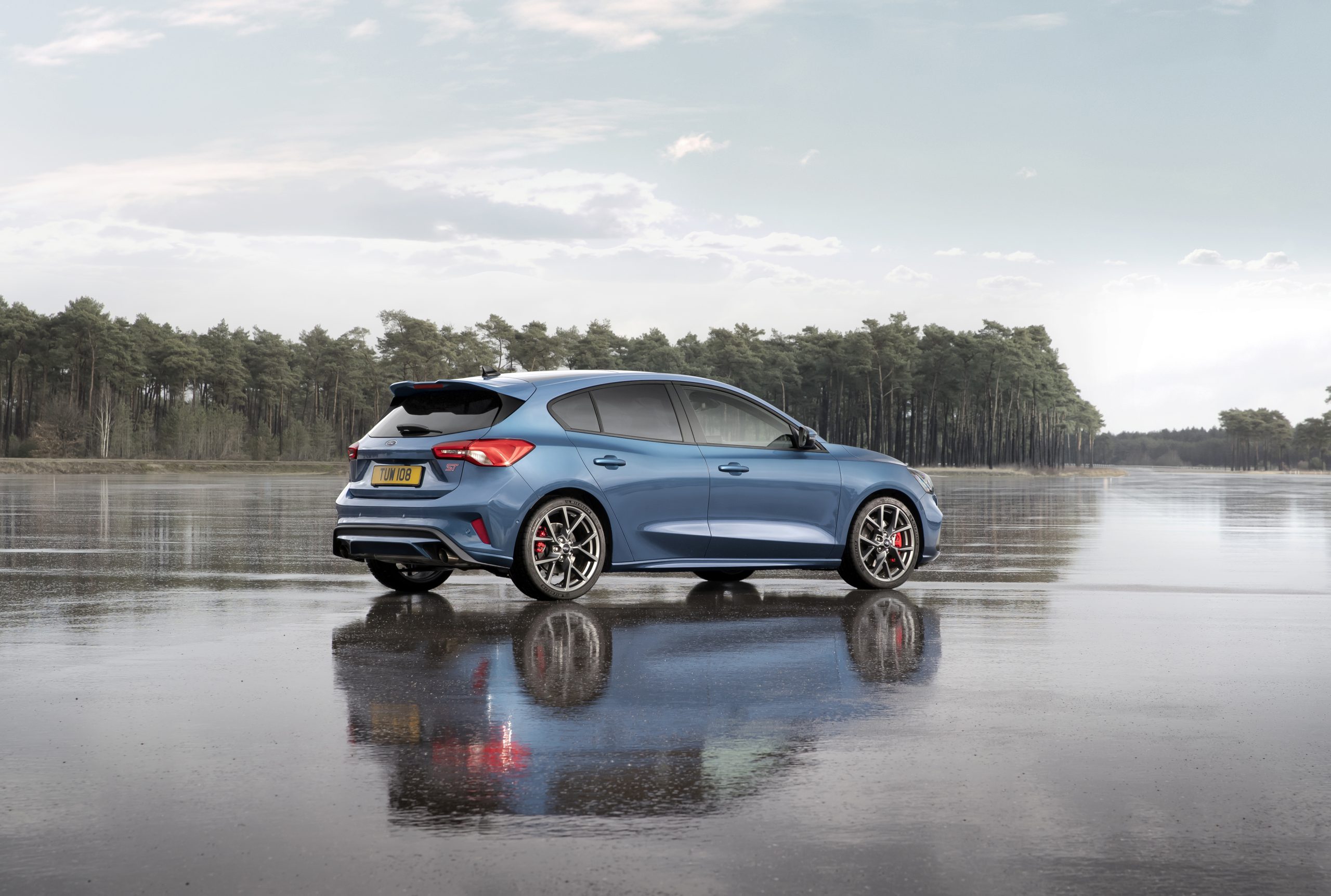
# # #
Android and Android Auto are trademarks of Google Inc.
*Officially homologated fuel-efficiency and CO2 emission figures will be published closer to on-sale date
Anticipated fuel-efficiency and CO2 emission figures from:
| Powertrain and body style | Anticipated CO2emissions combined (g/km) | Anticipated fuel efficiency combined (l/100 km) |
| 2.3-litre EcoBoost petrol, 5-door, 6-speed manual | 175 | 7.6 |
| 2.3-litre EcoBoost petrol, wagon, 6-speed manual | 176 | 7.6 |
| 2.3-litre EcoBoost petrol, 5-door, 7-speed automatic | 182 | 8.0 |
| 2.3-litre EcoBoost petrol, wagon, 7-speed automatic | 183 | 8.0 |
| 2.0-litre EcoBlue diesel, 5-door, 6-speed manual | 124 | 4.8 |
| 2.0-litre EcoBlue diesel, wagon, 6-speed manual | 124 | 4.8 |
The declared Fuel/Energy Consumptions, CO2 emissions and electric range are measured according to the technical requirements and specifications of the European Regulations (EC) 715/2007 and (EC) 692/2008 as last amended. Fuel consumption and CO2 emissions are specified for a vehicle variant and not for a single car. The applied standard test procedure enables comparison between different vehicle types and different manufacturers. In addition to the fuel-efficiency of a car, driving behaviour as well as other non-technical factors play a role in determining a car’s fuel/energy consumption, CO2 emissions and electric range. CO2 is the main greenhouse gas responsible for global warming.
From 1 September 2017, certain new vehicles will be type-approved using the World Harmonised Light Vehicle Test Procedure (WLTP) according (EU) 2017/1151 as last amended, which is a new, more realistic test procedure for measuring fuel consumption and CO2 emissions. From 1 September 2018 the WLTP will fully replace the New European Drive Cycle (NEDC), which is the current test procedure. During NEDC Phase-out, WLTP fuel consumption and CO2 emissions are being correlated back to NEDC. There will be some variance to the previous fuel economy and emissions as some elements of the tests have altered i.e., the same car might have different fuel consumption and CO2 emissions.


